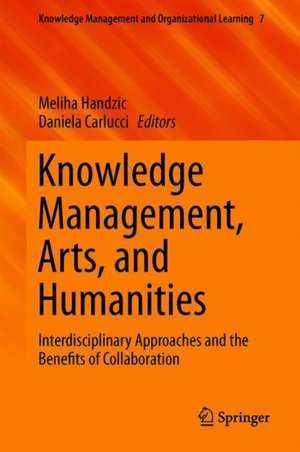Knowledge Management, Arts, and Humanities: Interdisciplinary Approaches and the Benefits of Collaboration: Knowledge Management and Organizational Learning, cartea 7
Editat de Meliha Handzic, Daniela Carluccien Limba Engleză Hardback – 15 apr 2019
Preț: 645.47 lei
Preț vechi: 759.37 lei
-15% Nou
Puncte Express: 968
Preț estimativ în valută:
123.50€ • 128.96$ • 101.99£
123.50€ • 128.96$ • 101.99£
Carte tipărită la comandă
Livrare economică 15-29 aprilie
Preluare comenzi: 021 569.72.76
Specificații
ISBN-13: 9783030109219
ISBN-10: 3030109216
Pagini: 200
Ilustrații: XVII, 252 p. 80 illus., 70 illus. in color.
Dimensiuni: 155 x 235 mm
Greutate: 0.56 kg
Ediția:1st ed. 2019
Editura: Springer International Publishing
Colecția Springer
Seria Knowledge Management and Organizational Learning
Locul publicării:Cham, Switzerland
ISBN-10: 3030109216
Pagini: 200
Ilustrații: XVII, 252 p. 80 illus., 70 illus. in color.
Dimensiuni: 155 x 235 mm
Greutate: 0.56 kg
Ediția:1st ed. 2019
Editura: Springer International Publishing
Colecția Springer
Seria Knowledge Management and Organizational Learning
Locul publicării:Cham, Switzerland
Cuprins
Introduction: Knowledge Management, Arts and Humanities: Setting the Scene.- Arts and Humanities in Knowledge Management: Clay Workshop as a Method for Recognising and Creating Individual Knowledge.- Understanding and Fostering Collective Ideation: An Improvisation-based Method.- What Can Knowledge Creating Organisations Learn from Theatrical Improvision?.- Transferring Cultural Knowledge Through Arts: Two Digital Stories.- Aesthetic Knowledge Diagrams: Bridging Understanding and Communication.- Knowledge Management in Arts and Humanities: Humanists' Virtual Knowledge Space: Model and Usage.- Managing Archaeological Knowledge in Digital Environment.- Poetry Visualisation in Digital Technology.- What Can Social Media Data Add to the Knowledge of Arts and Humanities? An Empirical Investigation on Twitter at Teatro Alla Scala.- Intellectual Capital of the Cultural Heritage Ecosystems: A Knowledge Dynamics Approach.- Conclusion: Beyond Lessons Learned: Opportunities and Challenges for Interplay Between Knowledge Management, Arts and Humanities in the Digital Age.
Notă biografică
Meliha Handzic is Professor of management and information systems at the International Burch University, Sarajevo. Her PhD is from the University of New South Wales, Sydney. Prof. Handzic’s main research interests lie in the areas of knowledge management and decision support. She has published on these topics in leading journals and books, and is the co-editor of the Springer series 'Knowledge Management and Organizational Learning'.
Daniela Carlucci, PhD in business management, is Assistant Professor at the University of Basilicata, Italy. Her research interests focus on knowledge assets and intellectual capital management, project and performance management, decision support and arts in business. She has authored and co-authored over 100 publications on a range of research topics.
Textul de pe ultima copertă
This book presents a series of studies that demonstrate the value of interactions between knowledge management with the arts and humanities. The carefully compiled chapters show, on the one hand, how traditional methods from the arts and humanities – e.g. theatrical improvisation, clay modelling, theory of aesthetics – can be used to enhance knowledge creation and evolution. On the other, the chapters discuss knowledge management models and practices such as virtual knowledge space (BA) design, social networking and knowledge sharing, data mining and knowledge discovery tools. The book also demonstrates how these practices can yield valuable benefits in terms of organizing and analyzing big arts and humanities data in a digital environment.
Caracteristici
Provides empirical evidence on the benefits of cross-breeding knowledge management with arts and humanities Demonstrates how traditional methods from arts and humanities help in knowledge creation and evolution Shows how knowledge management models and practices can provide valuable benefits in a digital environment for these fields











